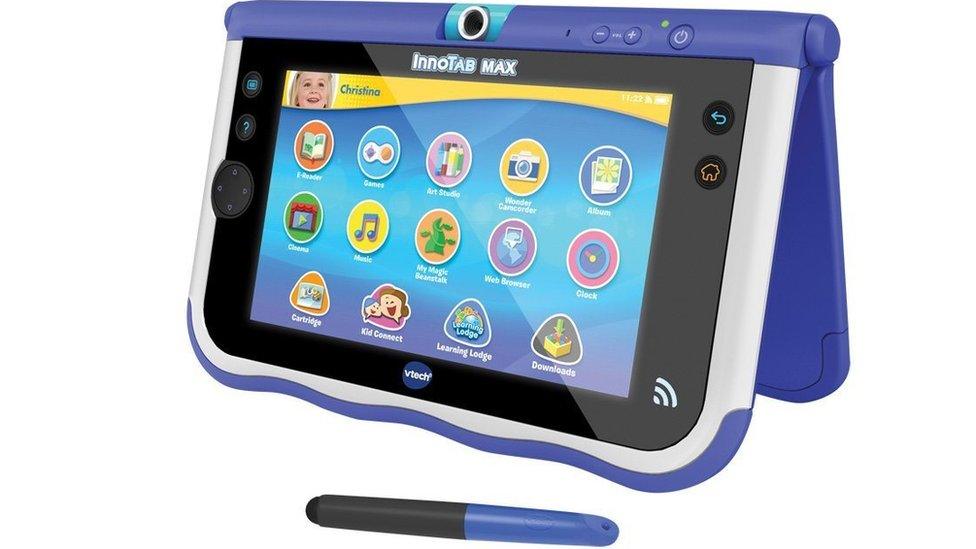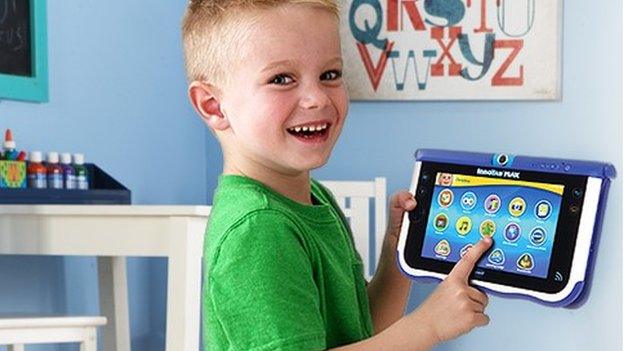VTech flags tablet flaw after BBC Watchdog probe
- Published

VTech allows parents to determine which sites their children can visit with the tablet
Child gadget-maker VTech's website is promoting a security fix for its flagship tablet, following an investigation by BBC Watchdog Live.
The Storio Max - which is called the InnoTab Max in the UK - suffers a software flaw that could allow hackers to remotely take control of the device and snoop on its users.
VTech was alerted to the vulnerability months ago by a UK cyber-security firm.
The Chinese company issued a fix but some parents have yet to install it.
The notice at the top of its homepage and the broadcast of the BBC programme should ensure the issue gets more prominence.
It had previously relied on pop-up alerts that appeared on the devices themselves to prompt owners into action.
VTech said it was also contacting retailers that are selling affected units.
The issue has come to light nearly three years after the firm was criticised for its handling of a separate cyber-security incident that exposed millions of its child customers' account details.
Vtech markets the Max tablets to children aged between three and nine years old.
"This was a controlled and targeted 'ethical hack' by... a sophisticated cyber-firm that was in possession of a detailed knowledge of hacking techniques and InnoTab/Storio Max's firmware," said VTech in a statement about the latest incident.
"We are not aware of any actual attempt to exploit the vulnerability and we consider the prospects of this happening to be remote.
"However, the safety of children is our top priority and we are constantly looking to improve the security of our devices."
Hacked webcam
Vtech's Max tablets are designed to allow parents to restrict their children to websites that they have personally approved.

VTech markets the tablets as being suitable for children as young as three
But earlier this year, researchers at London-based SureCloud discovered a flaw in the firm's software that they said made it vulnerable to attack if one or more of the pre-vetted sites were compromised.
"To find the vulnerability in the first place wasn't easy," Luke Potter, the firm's cyber-security practice director told BBC News.
"But to actually exploit it once you know it's there is reasonably simple."
The flaw means that malicious code can be remotely triggered to run on the devices from afar.
Mr Potter said this could involve making use of "off-the-shelf" malware available from criminal markets or running customised code.
"Remote access can be gained without the child even knowing," he explained.
"So effectively being able to monitor the child, listen to them, talk to them, have full access and control of the device.
"For example, we demonstrated viewing things through the webcam."
'Rigorous tests'
Mr Potter said that after his firm informed VTech of the problem it was quick to issue a software fix in May.
VTech boasts about its safety credentials on its website, saying that '"through rigorous testing, we maintain strict control and supervision over the quality of our products".

SecureCloud said the problem was in VTech's software and not the underlying Android system
It told Watchdog Live: "We thank SureCloud for bringing this vulnerability... to our attention. We took immediate action in early summer to resolve the issue and pushed out a firmware upgrade to all affected InnoTab/Storio Max devices in Europe."
The company added that it had recently sent an email to European owners who had not performed the upgrade to urge them to do so.
But until BBC Watchdog Live got involved, VTech had not specifically warned customers about the security vulnerability or the risks it posed.
An "upgrade reminder" on its website, external is now more explicit and provides an illustrated step-by-step guide to applying the fix.
However, Mr Potter said the issue might have been picked up at an earlier stage had the tablets been subject to more thorough checks before going on sale.
"Any cyber-security firm that is following a best-practice approach to testing these devices... would be likely to have spotted this issue," he said.
The full report on the vulnerability can be seen on Watchdog Live tonight at 2000GMT on BBC One.
- Published9 January 2018

- Published11 February 2016

- Published10 February 2016
